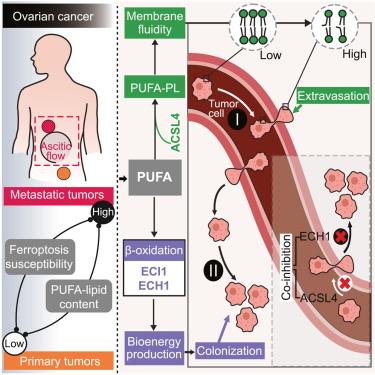Our official English website, www.x-mol.net, welcomes your
feedback! (Note: you will need to create a separate account there.)
ACSL4 and polyunsaturated lipids support metastatic extravasation and colonization
Cell ( IF 45.5 ) Pub Date : 2024-11-25 , DOI: 10.1016/j.cell.2024.10.047 Yuqi Wang, Mangze Hu, Jian Cao, Fengxiang Wang, Jingrong Regina Han, Tianshu William Wu, Luxiao Li, Jinshi Yu, Yujing Fan, Guanglei Xie, Heyuan Lian, Yueying Cao, Nathchar Naowarojna, Xi Wang, Yilong Zou
Cell ( IF 45.5 ) Pub Date : 2024-11-25 , DOI: 10.1016/j.cell.2024.10.047 Yuqi Wang, Mangze Hu, Jian Cao, Fengxiang Wang, Jingrong Regina Han, Tianshu William Wu, Luxiao Li, Jinshi Yu, Yujing Fan, Guanglei Xie, Heyuan Lian, Yueying Cao, Nathchar Naowarojna, Xi Wang, Yilong Zou

|
Metastatic dissemination to distant organs demands that cancer cells possess high morphological and metabolic adaptability. However, contributions of the cellular lipidome to metastasis remain elusive. Here, we uncover a correlation between metastasis potential and ferroptosis susceptibility in multiple cancers. Metastases-derived cancer cells exhibited higher ferroptosis sensitivity and polyunsaturated fatty acyl (PUFA)-lipid contents than primary-tumor-derived cells from ovarian cancer patients. Metabolism-focused CRISPR screens in a mouse model for ovarian cancer distant metastasis established via two rounds of in vivo selection revealed the PUFA-lipid biosynthesis enzyme acyl-coenzyme A (CoA) synthetase long-chain family member 4 (ACSL4) as a pro-hematogenous metastasis factor. ACSL4 promotes metastatic extravasation by enhancing membrane fluidity and cellular invasiveness. While promoting metastasis, the high PUFA-lipid state creates dependencies on abhydrolase-domain-containing 6, acylglycerol lipase (ABHD6), enoyl-CoA delta isomerase 1 (ECI1), and enoyl-CoA hydratase 1 (ECH1)—rate-limiting enzymes preparing unsaturated fatty acids (UFAs) for β-oxidation. ACSL4/ECH1 co-inhibition achieved potent suppression of metastasis. Our work establishes the dual functions of PUFA-lipids in tumor progression and metastasis that may be exploitable for therapeutic development.
中文翻译:

ACSL4 和多不饱和脂质支持转移性外渗和定植
向远处器官的转移性播散要求癌细胞具有高度的形态学和代谢适应性。然而,细胞脂质组对转移的贡献仍然难以捉摸。在这里,我们揭示了多种癌症中转移可能性与铁死亡易感性之间的相关性。与卵巢癌患者的原代肿瘤来源的细胞相比,转移源性癌细胞表现出更高的铁死亡敏感性和多不饱和脂肪酰基 (PUFA) 脂质含量。通过两轮 体内选择建立的卵巢癌远处转移小鼠模型中以代谢为重点的 CRISPR 筛选揭示了 PUFA-脂质生物合成酶酰基辅酶 A (CoA) 合成酶长链家族成员 4 (ACSL4) 作为促血源性转移因子。ACSL4 通过增强膜流动性和细胞侵袭性来促进转移性外渗。在促进转移的同时,高 PUFA 脂质状态对含有水解酶结构域的 6、酰基甘油脂肪酶 (ABHD6)、烯酰辅酶 A δ 异构酶 1 (ECI1) 和烯酰辅酶 A 水合酶 1 (ECH1) 产生依赖性,这些酶是制备用于β氧化的不饱和脂肪酸 (UFA) 的限速酶。ACSL4/ECH1 共抑制实现了对转移的有效抑制。我们的工作确定了 PUFA 脂质在肿瘤进展和转移中的双重功能,可用于治疗开发。
更新日期:2024-11-25
中文翻译:

ACSL4 和多不饱和脂质支持转移性外渗和定植
向远处器官的转移性播散要求癌细胞具有高度的形态学和代谢适应性。然而,细胞脂质组对转移的贡献仍然难以捉摸。在这里,我们揭示了多种癌症中转移可能性与铁死亡易感性之间的相关性。与卵巢癌患者的原代肿瘤来源的细胞相比,转移源性癌细胞表现出更高的铁死亡敏感性和多不饱和脂肪酰基 (PUFA) 脂质含量。通过两轮 体内选择建立的卵巢癌远处转移小鼠模型中以代谢为重点的 CRISPR 筛选揭示了 PUFA-脂质生物合成酶酰基辅酶 A (CoA) 合成酶长链家族成员 4 (ACSL4) 作为促血源性转移因子。ACSL4 通过增强膜流动性和细胞侵袭性来促进转移性外渗。在促进转移的同时,高 PUFA 脂质状态对含有水解酶结构域的 6、酰基甘油脂肪酶 (ABHD6)、烯酰辅酶 A δ 异构酶 1 (ECI1) 和烯酰辅酶 A 水合酶 1 (ECH1) 产生依赖性,这些酶是制备用于β氧化的不饱和脂肪酸 (UFA) 的限速酶。ACSL4/ECH1 共抑制实现了对转移的有效抑制。我们的工作确定了 PUFA 脂质在肿瘤进展和转移中的双重功能,可用于治疗开发。






























 京公网安备 11010802027423号
京公网安备 11010802027423号